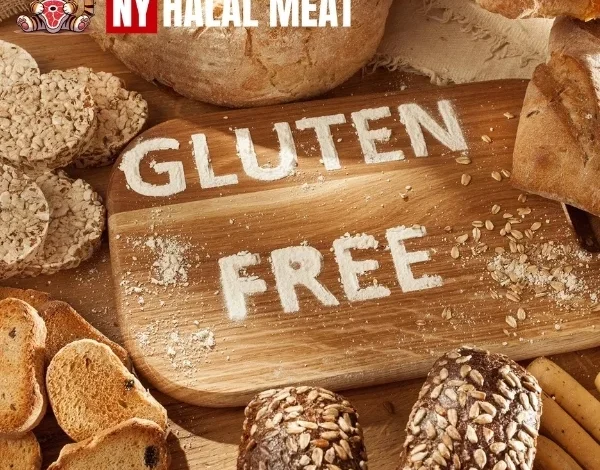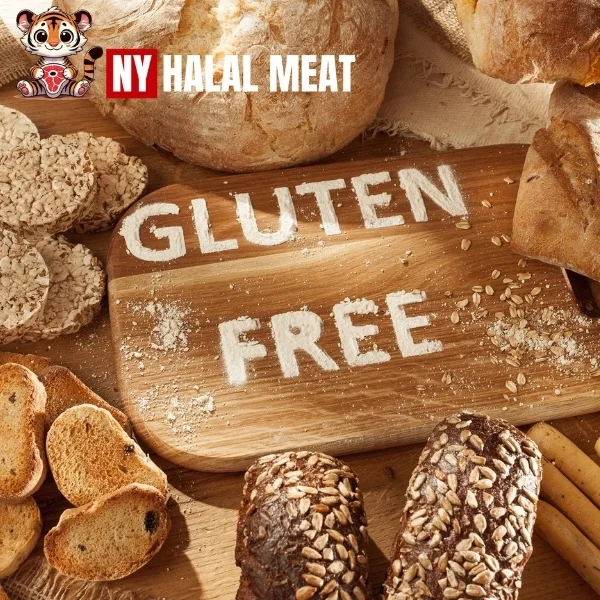
Is Halal Food Gluten-Free?
What Is Halal Food?
Halal refers to food that complies with Islamic dietary guidelines, which include rules about the type of food that can be consumed, how animals should be slaughtered, and how food should be prepared. For example, halal meat comes from permissible animals (like cattle, sheep, or poultry) and is slaughtered in a specific way that aligns with Islamic law. Halal also prohibits certain foods, such as pork, and the consumption of alcohol.
While halal food has clear standards regarding the permissibility of certain ingredients, it doesn’t inherently address gluten, which is a protein found in wheat, barley, and rye. Therefore, not all halal food is gluten-free.
What Does Gluten-Free Mean?
Gluten is a protein found in wheat, barley, and rye. For people with celiac disease or gluten sensitivity, consuming gluten can lead to adverse reactions such as digestive issues and inflammation. A gluten-free diet excludes foods that contain gluten, including bread, pasta, and many processed foods that contain wheat or other gluten-containing grains.
Is Halal Food Gluten-Free?
Halal food is not inherently gluten-free. The halal dietary laws do not specifically address gluten. Therefore, many foods that are halal may still contain gluten, especially when they involve processed or packaged items.
For example, many popular foods such as bread, pizza, pasta, sauces, and snacks often contain gluten. These items can still be halal if they do not contain prohibited ingredients like pork or alcohol, but they may not be suitable for someone on a gluten-free diet.
However, there are many foods that are naturally gluten-free and can also be halal. Fresh vegetables, fruits, meats (when not processed with gluten-containing ingredients), and certain grains are naturally gluten-free and can easily fit within a halal diet.
How to Choose Halal and Gluten-Free Food?
If you’re looking for food that meets both halal and gluten-free criteria, here are some tips to help you make the right choices:
- Stick to Whole Foods: Fruits, vegetables, and unprocessed meats are naturally both halal and gluten-free. Fresh cuts of chicken, beef, lamb, and seafood are safe options as long as they are free from gluten-containing additives or marinades.
- Read Labels Carefully: When shopping for packaged food, always check the labels for any gluten-containing ingredients. Many halal food products are now labeled as gluten-free, making it easier to find items that meet both dietary requirements.
- Look for Certified Products: Some manufacturers and stores provide products that are both halal and certified gluten-free. These products will often have two certifications on the label, ensuring they meet both dietary guidelines.
- Ask at Restaurants or Food Vendors: If you’re dining out, many restaurants now offer halal and gluten-free menu options. It’s always a good idea to ask your server about the ingredients in any sauces, marinades, or dressings that might contain gluten.
Gluten-Free Halal Food Options
Here are a few examples of halal foods that are naturally gluten-free:
- Fruits and Vegetables: All fresh fruits and vegetables are naturally gluten-free, offering a wide range of options for your meals.
- Meats and Seafood: Fresh halal cuts of meat and seafood like chicken, beef, lamb, and fish are naturally gluten-free unless they are processed or contain added gluten-based ingredients.
- Rice and Potatoes: Both rice and potatoes are gluten-free and pair well with a variety of halal dishes.
- Legumes: Beans, lentils, and peas are gluten-free and can be a great source of protein in a halal diet.
- Gluten-Free Grains: Grains such as quinoa, millet, and corn are naturally gluten-free and offer variety in your diet.
Processed Gluten-Free Halal Foods
As the demand for gluten-free products continues to rise, many halal-certified brands now offer gluten-free alternatives, including:
- Gluten-Free Halal Breads and Crackers: Specially made without gluten, these products are suitable for both halal and gluten-free diets.
- Gluten-Free Halal Sauces and Dressings: Some halal food brands offer sauces and dressings that are free from gluten, making it easier to enjoy meals.
- Gluten-Free Snacks: Look for gluten-free halal chips, nuts, and other snack options that cater to both dietary needs.
Conclusion
While halal food is not automatically gluten-free, it is entirely possible to enjoy both dietary practices. By focusing on whole, fresh foods and being mindful of ingredients in processed products, individuals can find a variety of options that meet both halal and gluten-free requirements. Whether you’re new to the gluten-free lifestyle or are following a halal diet, with some awareness and planning, it’s easier than ever to enjoy delicious, nourishing meals that align with your dietary choices.






